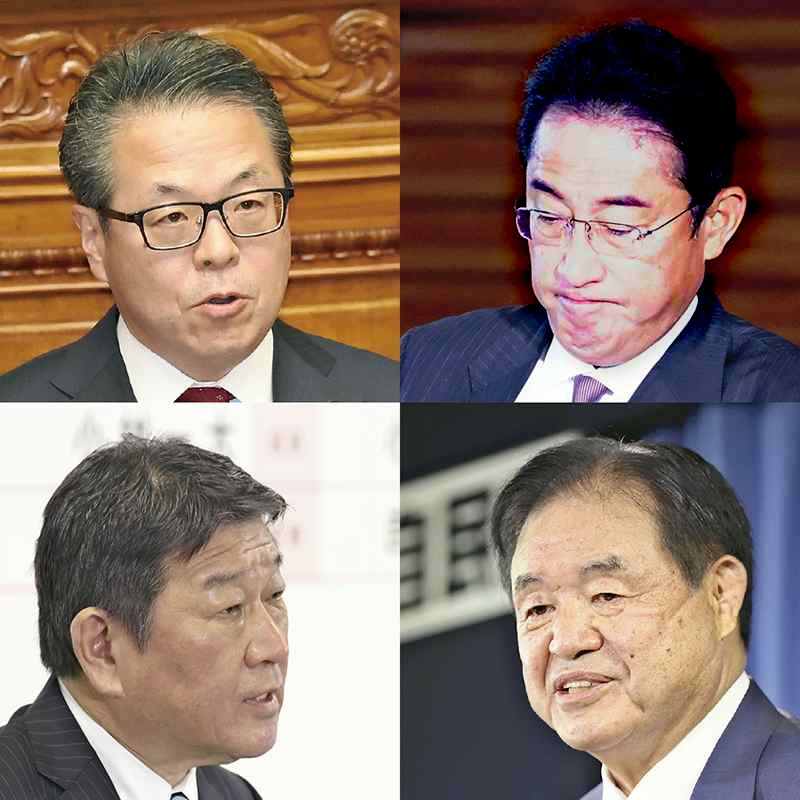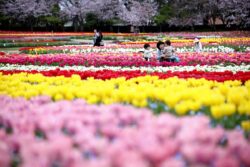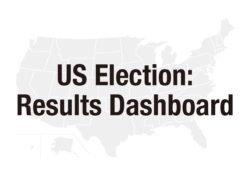Kishida’s first-year report card / Public opinion of Kishida’s Cabinet changes sharply over Unification Church

Clockwise from top left: secretary general for the LDP in the House of Councillors Hiroshige Seko; Prime Minister Fumio Kishida; General Council Chairperson Toshiaki Endo; and LDP Secretary General Toshimitsu Motegi
6:00 JST, October 6, 2022
The Cabinet of Prime Minister Fumio Kishida reached the one-year anniversary of its inauguration on Tuesday with its approval rating on the decline. In this first installment of a series, The Yomiuri Shimbun examines the “Kishida-style politics” of the past year to analyze what the future holds for the prime minister’s administration.
***
“Many cabinets in the past have lost support. Times like this happen,” Kishida, 65, said as if to himself on the evening of Sept. 12 at a Chinese restaurant in a hotel in Marunouchi, Tokyo. Then he downed a glass of Aomori Prefecture nagaimo shochu on the rocks, a distilled liquor made from yam potatoes.
“Even the Abe Cabinet once saw its approval rating drop to around 30%. We have to be patient now,” concurred Toshiaki Endo, 72, the chairperson of the Liberal Democratic Party’s General Council, tipping his own glass.
Support was strong after the inauguration of the Kishida Cabinet, staying at about 60% in nationwide surveys conducted by The Yomiuri Shimbun. It began declining in August, however, and eventually dropped to 50%.
Given that the Kishida faction is only the fourth largest in the LDP, its power base within the party is by no means solid. The Cabinet’s high approval rating had been bolstering the faction’s momentum, and some party members have said Kishida looks anxious lately.
The LDP won the House of Councillors election in July, despite facing the sixth wave of the novel coronavirus pandemic and high prices associated with Russia’s invasion of Ukraine.
People close to Kishida drew confidence from the results, which seemed to indicate that the Cabinet has been praised for overcoming the two crises, which could be described as threats to the entire nation.
But the tide of public opinion suddenly turned when it became clear that a number of LDP lawmakers had had contact with the Family Federation for World Peace and Unification, widely known as the Unification Church. The federation is in trouble over its alleged practice of fraudulently selling goods or services claimed to bring supernatural benefits to the purchaser.
When these problems began to surface in mid-July, Kishida had little awareness of how serious the situation was, which led him to initially underestimate the risks involved.
Disclosing names
On the morning of Sept. 6, the atmosphere was tense in the LDP presidential reception room on the fourth floor of LDP headquarters. Among those gathered were Kishida, who also serves as LDP president; LDP Secretary General Toshimitsu Motegi, 66; secretary general for the LDP in the House of Councillors Hiroshige Seko, 59, and Endo.
They discussed how many of the 179 Diet members of the LDP who had been identified in the party’s investigation as having had contact with the Unification Church should have their names made public.
Kishida said grimly that all the names should be made public, but Motegi objected, saying, “Some members’ secretaries sent congratulatory telegrams on their own initiative.”
Motegi expressed his displeasure as Endo also insisted that all the names should be released. Motegi felt it would be too severe to release even the names of LDP members who had only had a slight involvement with the Unification Church.
Ultimately, the group agreed with Seko’s proposal of releasing the names of LDP lawmakers who had addressed Unification Church meetings or been more involved with the group than that.
Under these criteria, the number of names to be released reached 121. Motegi announced them on Sept. 8.
Diet members complain
There were complaints from Diet members whose names were released. A mid-ranking Diet member said: “I just showed up at a meeting [of the Unification Church] without knowing it. I shouldn’t be treated in the same way as those who had close ties with the organization.”
“Only the LDP is being criticized, even though there are many opposition party members who have contacts with them,” another lawmaker said.
However, the public had become so critical that such logic no longer applied. The misreading of public opinion by the Prime Minister’s Office and the LDP cadre only served to make things worse.
At first, the LDP leadership was reluctant to conduct an internal investigation because many of the Cabinet ministers and Diet members who had had contact with the federation were thought to belong to the Abe faction. The party thought the issue should be explained by the faction or individual Diet member.
Kishida also left the handling of the matter to the party. Those close to the prime minister regretted that no one anticipated it would become such a major issue.
It was not until late August that the party finally launched an internal investigation.
Coming as it did after major opposition parties such as the Constitutional Democratic Party of Japan and Nippon Ishin no Kai (Japan Innovation Party) had already announced the results of their internal investigations, it cannot be denied that the launch of the LDP’s investigation was too little too late.
Moreover, it turned out that a wide range of party lawmakers, not just those in the Abe faction, had had contact with the Unification Church.
Even after the investigation findings were made public, a number of new cases came to light in which members of the Diet had had contact with the Unification Church, including Deputy Chief Cabinet Secretary Seiji Kihara, 52, and economic revitalization minister Daishiro Yamagiwa, 54. This added to the decline in support.
Inadequate arrangements
There was also criticism of former Prime Minister Shinzo Abe’s state funeral, in part due to inadequate arrangements by the Prime Minister’s Office.
The government decided to spend about ¥250 million from the reserve fund to cover such expenses as the venue for the funeral. At the request of the opposition parties, it announced an overall estimated total of about ¥1.66 billion that included security and other costs.
The LDP had planned to calculate the total amount of the budget for the state funeral after the event. However, due to Kishida’s order to “explain carefully,” it estimated the total amount in advance. This effort backfired.
The LDP’s additional announcement gave the impression that information was being released little by little.
CDPJ Diet Affairs Committee Chairperson Jun Azumi took this opportunity to criticize the government’s decision, saying, “It seems to be an attempt to make things look smaller.”
“The government should have either made a rough estimate of the total at first, or not released any figure until after the state funeral,” an LDP veteran lawmaker said. “We were completely taken in by the opposition parties.”
When the administration of former Prime Minister Yoshihide Suga was inaugurated in 2020, Suga’s style as a politician was compared to a skillful craftsman. He made progress with policies such as lowering cell phone rates and providing insurance coverage for fertility treatments.
Nevertheless, toward the end of his term, he was criticized for “a lack of explanation” on measures against the novel coronavirus and other issues. Suga’s approval rating declined, forcing him to step down after only one year.
Kishida, who has two years remaining in his term as party president, will have to restore trust in the administration, to maintain the driving force behind his policies.
During his election campaign in September last year, Kishida often said, “If the people have no faith in the government, the state cannot stand,” regarding the stagnation of the Suga administration. Now those words are being used against him.
"Politics" POPULAR ARTICLE
JN ACCESS RANKING







